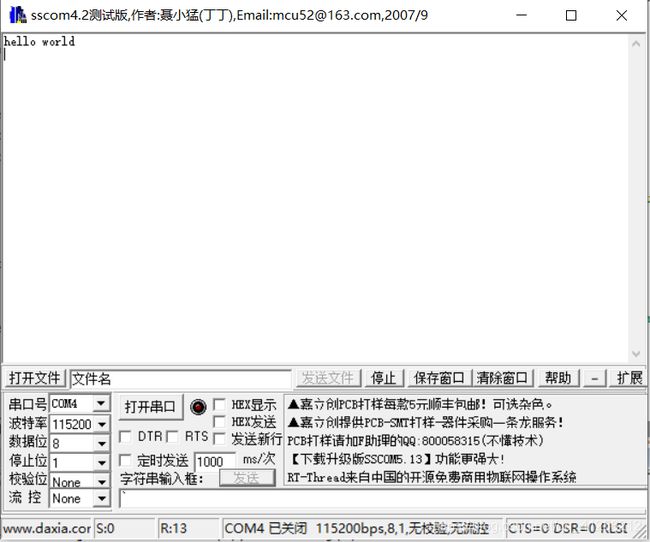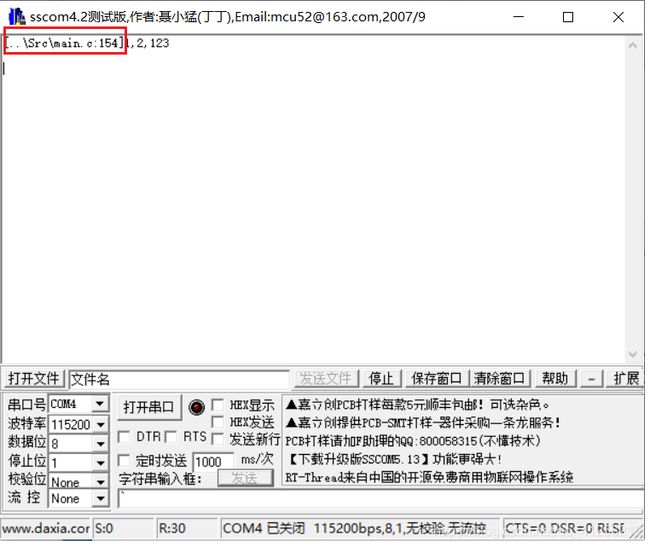printf重定向、仿printf函数、调试宏
1、printf函数重定向
在用电脑学习C语言时,我们经常使用printf函数来打印调试信息,比如某个变量的值,屏幕将显示该变量的值。在学习微处理器编程时,我们是否也能使用printf函数来打印调试信息呢?那当然是可以的。我们可以重定向printf函数,使其调试信息输出到串口上,然后通过串口调试助手来观察调试信息。printf函数底层调用fputc来输出调试信息,因此我们可以编写该函数来实现printf的重定向,如下代码所示:
#include
int fputc (int c, FILE * stream)
{
// HAL_UART_Transmit将字符c输出到串口上
HAL_UART_Transmit(&UartHandle, (uint8_t *)&c, 1, 10);
return c;
}
由于我们使用了printf C库函数,因此还得在将C库添加到工程中,比如在keil Options forTarget中的Target面板勾选上 Use MicroLIB,如下所示:
这样在main中,我们就可以调用printf函数来输出调试信息(注意要在串口初始化完成后调用printf函数),比如printf("hello world\r\n");,打开串口调试工具,匹配好波特率,就能看到如下信息窗口:
2、自己编写仿printf函数
由于使用C库函数,这样会使编译出来的代码容量变大,因此有时候需要自己编写仿printf函数,如下是笔者基于开源软件修改的仿printf函数my_printf代码:
/*
Copyright 2001, 2002 Georges Menie (www.menie.org)
stdarg version contributed by Christian Ettinger
This program is free software; you can redistribute it and/or modify
it under the terms of the GNU Lesser General Public License as published by
the Free Software Foundation; either version 2 of the License, or
(at your option) any later version.
This program is distributed in the hope that it will be useful,
but WITHOUT ANY WARRANTY; without even the implied warranty of
MERCHANTABILITY or FITNESS FOR A PARTICULAR PURPOSE. See the
GNU Lesser General Public License for more details.
You should have received a copy of the GNU Lesser General Public License
along with this program; if not, write to the Free Software
Foundation, Inc., 59 Temple Place, Suite 330, Boston, MA 02111-1307 USA
*/
/*
putchar is the only external dependency for this file,
if you have a working putchar, leave it commented out.
If not, uncomment the define below and
replace outbyte(c) by your own function call.
*/
#include "main.h"
extern UART_HandleTypeDef UartHandle;
#define putchar(c) HAL_UART_Transmit(&UartHandle, (uint8_t *)&c, 1, 10)
#include
static void printchar(char **str, int c)
{
//extern int putchar(int c);
if (str) {
**str = (char)c;
++(*str);
}
else
{
(void)putchar(c);
}
}
#define PAD_RIGHT 1
#define PAD_ZERO 2
static int prints(char **out, const char *string, int width, int pad)
{
register int pc = 0, padchar = ' ';
if (width > 0) {
register int len = 0;
register const char *ptr;
for (ptr = string; *ptr; ++ptr) ++len;
if (len >= width) width = 0;
else width -= len;
if (pad & PAD_ZERO) padchar = '0';
}
if (!(pad & PAD_RIGHT)) {
for ( ; width > 0; --width) {
printchar (out, padchar);
++pc;
}
}
for ( ; *string ; ++string) {
printchar (out, *string);
++pc;
}
for ( ; width > 0; --width) {
printchar (out, padchar);
++pc;
}
return pc;
}
/* the following should be enough for 32 bit int */
#define PRINT_BUF_LEN 12
static int printi(char **out, int i, int b, int sg, int width, int pad, int letbase)
{
char print_buf[PRINT_BUF_LEN];
register char *s;
register int t, neg = 0, pc = 0;
register unsigned int u = (unsigned int)i;
if (i == 0) {
print_buf[0] = '0';
print_buf[1] = '\0';
return prints (out, print_buf, width, pad);
}
if (sg && b == 10 && i < 0) {
neg = 1;
u = (unsigned int)-i;
}
s = print_buf + PRINT_BUF_LEN-1;
*s = '\0';
while (u) {
t = (unsigned int)u % b;
if( t >= 10 )
t += letbase - '0' - 10;
*--s = (char)(t + '0');
u /= b;
}
if (neg) {
if( width && (pad & PAD_ZERO) ) {
printchar (out, '-');
++pc;
--width;
}
else {
*--s = '-';
}
}
return pc + prints (out, s, width, pad);
}
static int print( char **out, const char *format, va_list args )
{
register int width, pad;
register int pc = 0;
char scr[2];
for (; *format != 0; ++format) {
if (*format == '%') {
++format;
width = pad = 0;
if (*format == '\0') break;
if (*format == '%') goto out;
if (*format == '-') {
++format;
pad = PAD_RIGHT;
}
while (*format == '0') {
++format;
pad |= PAD_ZERO;
}
for ( ; *format >= '0' && *format <= '9'; ++format) {
width *= 10;
width += *format - '0';
}
if( *format == 's' ) {
register char *s = (char *)va_arg( args, int );
pc += prints (out, s?s:"(null)", width, pad);
continue;
}
if( *format == 'd' ) {
pc += printi (out, va_arg( args, int ), 10, 1, width, pad, 'a');
continue;
}
if( *format == 'x' ) {
pc += printi (out, va_arg( args, int ), 16, 0, width, pad, 'a');
continue;
}
if( *format == 'X' ) {
pc += printi (out, va_arg( args, int ), 16, 0, width, pad, 'A');
continue;
}
if( *format == 'u' ) {
pc += printi (out, va_arg( args, int ), 10, 0, width, pad, 'a');
continue;
}
if( *format == 'c' ) {
/* char are converted to int then pushed on the stack */
scr[0] = (char)va_arg( args, int );
scr[1] = '\0';
pc += prints (out, scr, width, pad);
continue;
}
}
else {
out:
printchar (out, *format);
++pc;
}
}
if (out) **out = '\0';
va_end( args );
return pc;
}
int my_printf(const char *format, ...)
{
va_list args;
va_start( args, format );
return print( 0, format, args );
}
int my_sprintf(char *out, const char *format, ...)
{
va_list args;
va_start( args, format );
return print( &out, format, args );
}
int my_snprintf( char *buf, unsigned int count, const char *format, ... )
{
va_list args;
( void ) count;
va_start( args, format );
return print( &buf, format, args );
}
int printf_test(void)
{
char *ptr = "Hello world!";
char *np = 0;
int i = 5;
unsigned int bs = sizeof(int)*8;
int mi;
char buf[80];
mi = (1 << (bs-1)) + 1;
my_printf("%s\r\n", ptr);
my_printf("my_printf test\r\n");
my_printf("%s is null pointer\r\n", np);
my_printf("%d = 5\r\n", i);
my_printf("%d = - max int\r\n", mi);
my_printf("char %c = 'a'\r\n", 'a');
my_printf("hex %x = ff\r\n", 0xff);
my_printf("hex %02x = 00\r\n", 0);
my_printf("signed %d = unsigned %u = hex %x\r\n", -3, -3, -3);
my_printf("%d %s(s)%\r\n", 0, "message");
my_printf("\r\n");
my_printf("%d %s(s) with %%\r\n", 0, "message");
my_sprintf(buf, "justif: \"%-10s\"\r\n", "left"); my_printf("%s", buf);
my_sprintf(buf, "justif: \"%10s\"\r\n", "right"); my_printf("%s", buf);
my_sprintf(buf, " 3: %04d zero padded\r\n", 3); my_printf("%s", buf);
my_sprintf(buf, " 3: %-4d left justif.\r\n", 3); my_printf("%s", buf);
my_sprintf(buf, " 3: %4d right justif.\r\n", 3); my_printf("%s", buf);
my_sprintf(buf, "-3: %04d zero padded\r\n", -3); my_printf("%s", buf);
my_sprintf(buf, "-3: %-4d left justif.\r\n", -3); my_printf("%s", buf);
my_sprintf(buf, "-3: %4d right justif.\r\n", -3); my_printf("%s", buf);
return 0;
}
/*
* if you compile this file with
* gcc -Wall $(YOUR_C_OPTIONS) -DTEST_PRINTF -c my_printf.c
* you will get a normal warning:
* my_printf.c:214: warning: spurious trailing `%' in format
* this line is testing an invalid % at the end of the format string.
*
* this should display (on 32bit int machine) :
*
* Hello world!
* my_printf test
* (null) is null pointer
* 5 = 5
* -2147483647 = - max int
* char a = 'a'
* hex ff = ff
* hex 00 = 00
* signed -3 = unsigned 4294967293 = hex fffffffd
* 0 message(s)
* 0 message(s) with %
* justif: "left "
* justif: " right"
* 3: 0003 zero padded
* 3: 3 left justif.
* 3: 3 right justif.
* -3: -003 zero padded
* -3: -3 left justif.
* -3: -3 right justif.
*/
/* To keep linker happy. */
int write( int i, char* c, int n)
{
(void)i;
(void)n;
(void)c;
return 0;
}
读者如若要移植上面仿printf代码,记得得重新定义putchar(c),如下是笔者调用printf_test测试函数测试的结果:
3、调试宏
在写代码时经常需要在代码中添加printf调试信息,调试完后再删除printf调试信息,有没有一种方法可以不用删除printf调试信息信息呢?当然有,那就是调试宏。调试完代码后,我们只需关掉调试的宏定义就行,而不用删除调试代码,完全不影响代码的容量。如下是笔者常用的调试宏:
extern int my_printf(const char *format, ...);
#define DEBUG 1
#if DEBUG > 0
#define DBG(format,...) my_printf("[%s:%d]"##format,__FILE__,__LINE__,__VA_ARGS__)
#else
#define DBG(format,x)
#endif
该调试宏DBG可以定位哪个文件哪一行代码出现问题,如下所示:
当调试完后,只需修改 宏定义DEBUG的值为0(#define DEBUG 0
),就能关闭调试信息。




